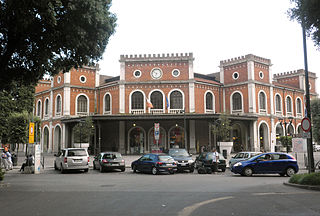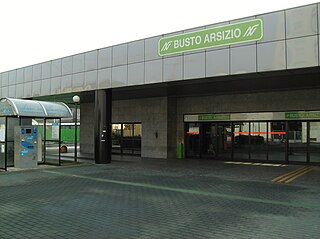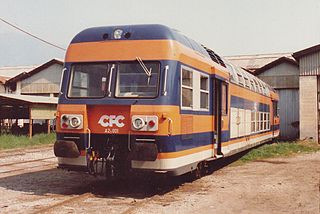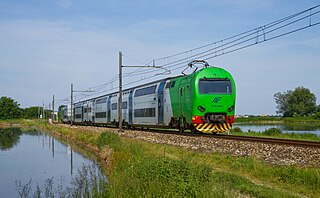| Type | Società per azioni |
|---|---|
| Industry | Rail transport |
| Founded | Milan, Italy (1985) |
| Headquarters | Milan , Italy |
Key people | Belingardi Vittorio, Luigi Legnani |
| Products | Rail infrastructure |
| Revenue | € 84,013,421 (2008) [1] |
| € 3,468,270 (2008) [2] | |
Number of employees | 931 (2008) [3] |
| Parent | Ferrovie Nord Milano |
| Website | www.ferrovienord.it |
Ferrovienord (prior to 2006, Ferrovie Nord Milano Esercizio) is an Italian transport company managing the network of regional railway concessions owned by the group in northern Italy. It is a subsidiary of Ferrovie Nord Milano.
The company was founded in 1985, as part of the transformation of Ferrovie Nord Milano SpA (FNM), a holding company. Its original name was Ferrovie Nord Milano Esercizio (FNME) and its objects were the management and maintenance of the FMN rail network and transport services on the network.
In 1987, the FNM, together with the Province of Brescia and the Società Nazionale Ferrovie e Tramvie (SNFT), [4] formed the Consorzio Brescia Nord (English: Consortium of Brescia North), the task of which was to take over the SNFT's concession for the Brescia–Iseo–Edolo railway. Five years later, the FNM acquired the SNFT, and took over its stake in the Consortium. Consequently, on 1 January 1993 the FNME received from its parent, the FNM, the right to operate the railway that had previously been exercised by the SNFT, and assumed its direct management.
In 2004, the FNM group adhered to the principle of accounting separation between infrastructure management and transport services. The FNME has since been managing the network and stations of the FNM group, while the departments related to passenger rail and freight were split from the holding company and allocated to two new companies. The Ferrovie Nord Milano Trasporti S.r.l. (now known as LeNORD) obtained the management of passenger traffic, while the Ferrovie Nord Cargo S.r.l. took over goods traffic.
On 15 May 2006, following a process of redefinition of the corporate identity of all group companies, the FNME was renamed FERROVIENORD. [5]
The company specializes in the management of a 319 km (198 mi) long rail network [6] and its 120 stations.
The activity is organized into two sections: the Milan branch and Iseo branch.
The Milan branch takes care of the regional line concessions operated by the group linking Milan with Brianza, Erba, Varese, Como, Novara, Brescia and Milan-Malpensa Airport. In particular, the railway lines under its responsibility are:
The Iseo branch of the company deals with the management of the Brescia–Iseo–Edolo and the Bornato–Rovato branch.
All lines are electrified at a voltage of 3000 volts DC, with the exception of two lines operated using diesel traction: Brescia–Edolo and Bornato–Rovato.

Ferrovie Nord Milano is an Italian public transport company: the second largest railway company in Italy. It operates primarily in the northern Italian regions of Lombardy and Piedmont and in Canton Ticino in southern Switzerland. Listed on the Borsa Italiana, its main shareholders are the Lombardy Region (57.57%), Ferrovie dello Stato (14.5%) and Aurelia S.p.A. (3%).

The Malpensa Express is an airport rail service linking the city of Milan with Malpensa Airport, in the region of Lombardy, Northern Italy.
LeNORD S.r.l. was a subsidiary of the FNM Group responsible for operating passenger train services in northern Italy.

The Milano–Chiasso railway line is an Italian state-owned railway connecting Milan to Como and Chiasso, Switzerland.

The Milan–Venice railway line is one of the most important railway lines in Italy. It connects the major city of Milan, in Lombardy, with the Adriatic Sea at Venice, in Veneto. The line is state-owned and operated by the state rail infrastructure company, Rete Ferroviaria Italiana that classifies it as a trunk line. The line is electrified at 3,000 volts DC.
Milano Porta Garibaldi is a major railway station in the Italian city of Milan, located just to the north of the neighbourhood known as Porta Garibaldi. Porta Garibaldi is the city's main station for commuter traffic with 25 million passengers annually, although it is second to Centrale station considering total passenger traffic. The station is located on Piazza Sigmund Freud.

Domodossola railway station serves the city and comune of Domodossola, in the Piedmont region, northwestern Italy. Opened in 1888, it forms a major break of gauge junction between standard gauge lines to Milan, Brig and Novara, and a metre gauge line to Locarno.

Novara railway station is the main station serving the city and comune of Novara, in the Piedmont region, northwestern Italy. Opened in 1854, it forms part of the Turin–Milan and is origin of the lines to Arona, to Alessandria, to Biella, Varallo, Domodossola and Luino, respectively.

Brescia railway station is the main station of Brescia, in the region of Lombardy, northern Italy. The station, opened in 1854, lies on the Milan-Venice railway and is a terminus of three branch lines: Valcamonica Railway to Edolo, Bergamo–Brescia railway and Brescia–Piadena/Cremona railway which branches off towards southeast of the station.

Treviglio railway station, also known as Treviglio centrale railway station is the main station serving the town and comune of Treviglio, in the region of Lombardy, northern Italy. Opened in 1878, it has a higher average number of passengers per day than Treviglio's other railway station, Treviglio Ovest.

Trenord is a railway company which is responsible for the operation of regional passenger trains in Lombardy. The company was established by the two main railway companies in Lombardy, Trenitalia and Ferrovie Nord Milano (FNM), to manage train operations in the region. The equity is equally divided between the two companies.

Milano Bovisa is a railway station in Bovisa, Milan, Italy. It opened in 1879 and is now one of the key nodes of the Milan suburban railway service, and of the Trenord regional network in northern Lombardy. It is located in Piazza Emilio Alfieri.

Busto Arsizio Nord is a railway station in Italy. Located on the Saronno–Novara railway, it serves the city of Busto Arsizio. It is joined by a junction track to the Busto Arsizio railway station, managed by Rete Ferroviaria Italiana. Some kilometers west from the station, at Bivio Sacconago, is the origin of the branch to Malpensa. The train services are operated by Trenord and TiLo.

The Milan–Asso railway is a regional railway line with standard track gauge which links Milan to Canzo crossing for Erba and other towns in Brianza. The most northern terminal is the station of Canzo-Asso, which is located in Canzo's territory but is also known as Asso in the short form. That, because there is another station on the line called Canzo station and Canzo-Asso is next to Asso's boundary and serves this commune too.

The A2n 001 was an experimental Diesel railcar built in Italy by CaFiCi consortium in 1982. Despite a long test period in several regional lines, the vehicle never came into regular service.

Rovato Borgo is a railway station serving the town of Rovato, in the region of Lombardy, northern Italy. The station opened in 1911 and is located on the Cremona-Iseo railway line. Train services are operated by the Italian railway company Trenord.

Saronno–Novara railway is a railway line in Lombardy, Italy.

Milan–Saronno railway is a railway line in Lombardy, Italy.

The Caravaggio is an electric multiple unit (EMU) developed and built by Hitachi Rail Italy. It is named after the Renaissance-era Italian painter Michelangelo Merisi da Caravaggio.

The Brescia-Iseo–Edolo railway is a railway line connecting the towns of Brescia, Iseo, and Edolo, in Lombardy, northern Italy.